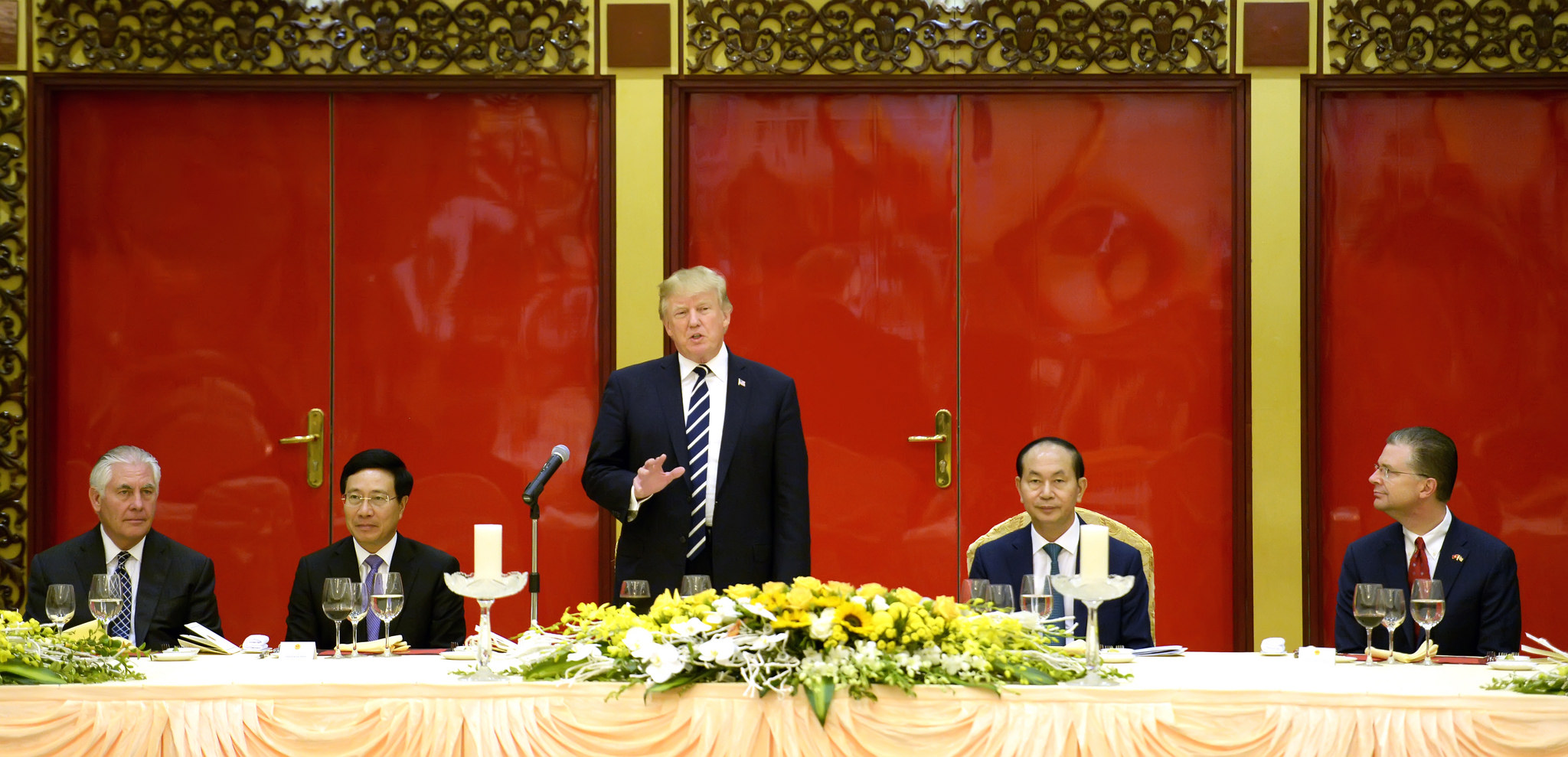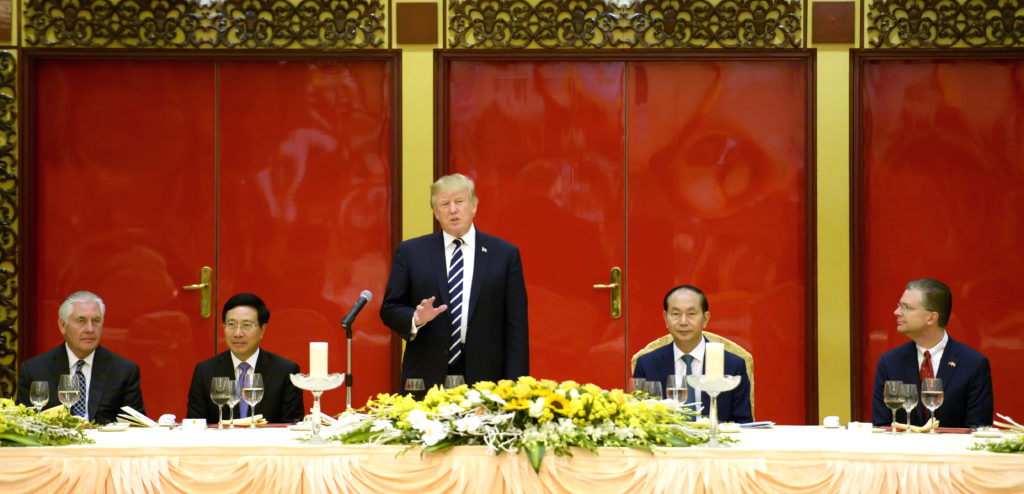An Assault on the State Department
 Donald Trump and Rex Tillerson Attend a Vietnamese State Dinner in Hanoi
https://flic.kr/p/Dh5RrU
Donald Trump and Rex Tillerson Attend a Vietnamese State Dinner in Hanoi
https://flic.kr/p/Dh5RrU
Donald Trump’s State Department has been one of controversy and bipartisan criticism. Beginning with the surprise announcement of Rex Tillerson as Secretary of State, the former CEO of Exxon without American foreign policy experience, it was made clear that Donald Trump’s State Department would be unorthodox. In May, the Trump administration submitted a budget which would cut funding for the State Department and the US Agency for International Development by 32%. Senator Lindsay Graham (R-SC) called the budget “radical and reckless when it comes to soft power” while Senator Patrick Leahy (D-VT) was also critical. However, Rex Tillerson defended the cuts by saying that that department would operate more efficiently and expected that imminent solutions to the world’s crises would render the extra funding useless. The State Department has also been placed under a hiring freeze and has offered buy outs to diplomats who quit or choose to retire early. The initial moves by Donald Trump’s administration indicate that the State Department will undertake a smaller role during his presidency.
Donald Trump’s attempts to weaken the foreign service have been met with bipartisan resistance. On November 15, Senators John McCain (R-AZ) and Jeanne Shaheen (D-NH) drafted a joint letter to Rex Tillerson expressing their concern over his attempts to reform the State Department. The senators cited concerns over the hiring freeze and understaffing, saying that it will, “inevitably result in shortages of appropriately experienced personnel at specific grades in future years.” Clearly, the Trump administration’s recent actions towards the State Department have been unpopular among lawmakers, both Democratic and Republican. Furthermore, and perhaps more importantly, there has been a reaction from within the Foreign Service itself.
State Department spokeswoman Heather Nauert acknowledged that there is a morale problem within the agency. Nauert mentioned that it broke her heart to hear that, “some feel that they aren’t wanted or aren’t needed or aren’t appreciated.” A cause of the morale problem has been a new centralized approach implemented in policy decision making by Rex Tillerson. A chart obtained by POLITICO illustrates the growing importance of Tillerson himself and senior aides in policy planning. The chart shows foreign policy ideas being cultivated by the State Department’s Policy Planning Staff and Rex Tillerson’s inner circle. The problem with this structure is that it doesn’t allow for ideas to come from foreign service officers who work internationally. It is important to recognize that this chart is one piece of paper that may not be representative of the decision making as a whole, but it is part of a worrying trend. To ignore their judgement and input not only marginalizes their role in the State Department and causes morale problems, but could be very dangerous in policy making. Foreign service officers are the backbone of the State Department, working in embassies throughout the world. These officers spend years training and amassing experience to learn the politics and culture of the countries they serve in. If their judgement and expertise is ignored or diminished, the foreign service will not make as informed policy decisions. Surely, the State Department’s Policy Planning Staff is an important body within the Department. They provide important analysis and offer a second opinion on decisions, but to ignore the role of foreign service officers throughout the world is dangerous.

https://flic.kr/p/Dh5RrU
Unfortunately, the morale problem is not the issue that has plagued the State Department. The hiring freeze has remained intact and a dizzying amount of resignations and retirements among senior staff has left the Department understaffed and lacking talent. Barbara Stephenson, the head of the American Foreign Service Association Union, cited figures in the Washington Post noting that 3 out of the 5 career ambassadors (the highest rank in the State Department) have resigned. Furthermore, the number of career ministers, the next rank, has decreased from 33 to 19 while 62 of the next-level ministers have resigned. This talent which has departed in recent months has left the State Department without many key members. It is important to note that these people are not immediately replaceable. According to Stephenson, “The talent being shown the door now is not only our top talent but also talent that cannot be replicated overnight.” A career ambassador must serve 15 years in senior positions in the government and 3 years as a career minister. Their expertise and experience cannot be created; it must be cultivated over years and decades. This, coupled with the fact that fewer people are choosing to enter the foreign service, could cripple the effectiveness of U.S. diplomacy for decades to come.
The diminishing role and effectiveness of the U.S. State Department will have significant consequences on America’s role in the world sphere. The draconian measures imposed on the State Department are part of a worrying trend of the U.S.’s recent isolationist behavior. After the G7 in May, Angela Merkel remarked that Europe “really must take our fate into our own hands” and cannot rely on the United States. Merkel’s comments illustrate how the world is preparing for life without the U.S. International diplomacy has not stopped with U.S. isolationism. Canada and Mexico have continued to commit to NAFTA, the Paris Climate Accord lives on without the United States, and the Trans Pacific Partnership (TPP) is still continuing to be negotiated, albeit facing problems. Without being involved in these treaties, the U.S. will have no input in creating terms favourable to the country and will not experience their benefits. Instead of profiting from the free trade of the TPP, they will now be at disadvantage for being outside of it. With the Trump administration’s gutting of the State Department, this trend will continue, leaving America behind. Donald Trump may preach an “America first” policy, but it has morphed into “America alone.”
Edited by Luca Loggia
